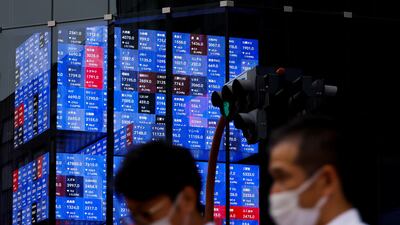Japan spent up to a record 2.8 trillion yen ($19.7 billion) intervening in the foreign exchange market last week to prop up the yen, Ministry of Finance data showed on Friday, draining nearly 15 per cent of funds it has readily available for intervention.
The figure was less than the 3.6tn yen estimated by Tokyo money market brokers for Japan's first dollar-selling, yen-buying intervention in 24 years to stem the currency's sharp weakening.
The ministry's figure, indicating total spending on currency intervention from August 30 to September 28, is widely believed to have been used entirely for the September 22 intervention.
It would surpass the previous record for dollar-selling, yen-buying intervention in 1998 of 2.62tn yen. Confirmation on the dates of the spending will be released in November.
“This was a big burst of intervention, if it had happened on a single day, underscoring Japanese authorities' determination to defend the yen,” said Daisaku Ueno, chief forex strategist at Mitsubishi UFJ Morgan Stanley Securities.
“But the impact of further intervention will diminish as long as Japan continues to intervene solo,” he said.
The intervention, conducted after the yen slumped to a 24-year low of nearly 146 to the dollar, triggered a sharp bounce of more than 5 yen per dollar from that low, although the currency has since drifted down again to around 144.25.
“Recent sharp, one-sided yen declines heighten uncertainty by making it difficult for companies to set business plans. It's therefore undesirable and bad for the economy,” Bank of Japan governor Haruhiko Kuroda was quoted as saying at a meeting with Cabinet ministers on Friday.
Japan held roughly $1.3tn in reserves, the second-biggest after China, of which $135.5bn was held as deposits parked with foreign central banks and the Bank for International Settlements (BIS), according to foreign reserves data released on September 7.
Those deposits can easily be tapped to finance further dollar-selling, yen-buying intervention.
Japan travel - in pictures
“Even if it were to intervene again, Japan likely won't have to sell US Treasury bills and instead tap this deposit for the time being,” said Izuru Kato, chief economist at Totan Research, a think tank arm of a major money market brokerage company in Tokyo.
If the deposits dry up, Japan would need to dip into its securities holdings sized around $1.04tn.
Of the main types of foreign assets Japan holds, deposits and securities are the most liquid and can be converted into cash immediately.
Other holdings include gold, reserves at the International Monetary Fund (IMF) and IMF special drawing rights, although procuring dollar funds from these assets would take time, analysts say.











